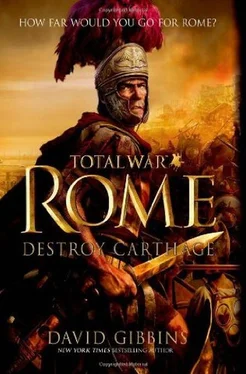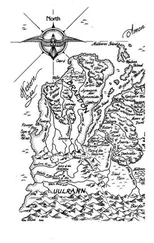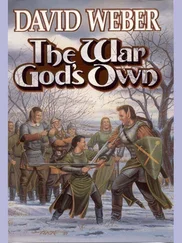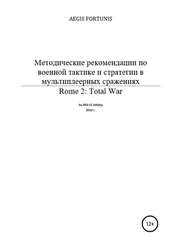David Gibbins - Total War Rome - Destroy Carthage
Здесь есть возможность читать онлайн «David Gibbins - Total War Rome - Destroy Carthage» весь текст электронной книги совершенно бесплатно (целиком полную версию без сокращений). В некоторых случаях можно слушать аудио, скачать через торрент в формате fb2 и присутствует краткое содержание. Год выпуска: 0101, Издательство: Thomas Dunne Books, Жанр: Исторические приключения, на английском языке. Описание произведения, (предисловие) а так же отзывы посетителей доступны на портале библиотеки ЛибКат.
- Название:Total War Rome: Destroy Carthage
- Автор:
- Издательство:Thomas Dunne Books
- Жанр:
- Год:0101
- ISBN:нет данных
- Рейтинг книги:5 / 5. Голосов: 1
-
Избранное:Добавить в избранное
- Отзывы:
-
Ваша оценка:
- 100
- 1
- 2
- 3
- 4
- 5
Total War Rome: Destroy Carthage: краткое содержание, описание и аннотация
Предлагаем к чтению аннотацию, описание, краткое содержание или предисловие (зависит от того, что написал сам автор книги «Total War Rome: Destroy Carthage»). Если вы не нашли необходимую информацию о книге — напишите в комментариях, мы постараемся отыскать её.
Total War Rome: Destroy Carthage — читать онлайн бесплатно полную книгу (весь текст) целиком
Ниже представлен текст книги, разбитый по страницам. Система сохранения места последней прочитанной страницы, позволяет с удобством читать онлайн бесплатно книгу «Total War Rome: Destroy Carthage», без необходимости каждый раз заново искать на чём Вы остановились. Поставьте закладку, и сможете в любой момент перейти на страницу, на которой закончили чтение.
Интервал:
Закладка:
‘I have a wife and child, in Sicily,’ the man said hoarsely. He fumbled with a leather pouch at his waist, and pulled out a little lead dog, his hand shaking. ‘My son made this for me. It’s our dog. It’s to bring me luck, so that Neptune will spare me.’
The man’s knees gave way, and the two centurions held him up, his head lolling. He dropped the dog, and it hit the stone with a leaden thump. Fabius stood over him, unflinching. They all had wives and children. It was the lot of soldiers, everywhere. Sometimes they returned to them, sometimes not. He reached down and picked up the dog, remembering his own dog Rufius, and put it into the man’s hand, closing his fist around it. ‘Neptune may have spared you death at sea, but Mars will not spare you now that you are on land,’ he said. ‘Your son’s prayers will speed you to Elysium, where you must await him, just as those who fell in battle at Pydna await their loved ones. To those comrades whom you deserted in their hour of need, you must account for yourself.’
He drew his sword and ran one finger along the blade, feeling its sharpness. He stood back and slowly turned around, the sword held high, so that all of the assembled soldiers could see. The man bowed backwards against the two legionaries, who had twisted him round and pinned his legs with their own to stop him from kicking. He was wild eyed, panting and foaming at the mouth, and Fabius saw the brown wetness down the legs that he had so often seen at executions, and smelt the foul odour. For a split second he remembered the boy Gaius Paullus, another casualty of Pydna all those years ago — whether he too had been a coward or a hero, and whether had he survived he might have proved himself as brave as this man had been in battle: the truth could never be known, only that the fortunes of war could break a man as easily as make him. He stood before the man, and spoke quietly. ‘Remember your son. Do not dishonour him. Remember who you are. You are a legionary of Rome. Stand to attention. Salute your general.’
Fabius nodded at the two legionaries, who looked at him uncertainly and then released the man, leaving him reeling and staggering backwards, slipping on his own faeces and urine. He fell down heavily on one hand and stayed there, panting and grimacing. Fabius gestured to the two legionaries to keep back, to give the man a chance to stand up without help, to allow those of his comrades who were watching the chance to tell his wife that he faced death with dignity. The man wiped his face with the back of his other hand, and then raised himself slowly up, wobbling back to where he had stood before and bringing his hand up in salute to Scipio, his fingers still bunched around the little model of the dog.
Fabius grasped the back of the man’s neck with his left hand and with the other thrust the sword below his ribcage, driving it up through the heart and lungs and windpipe until the tip came out through the back of his neck. The man exhaled once, a moaning gargle, and then died, his eyes wide open and his mouth gushing blood in pulses with the final beating of his heart.
Fabius let him fall, withdrawing the sword as he did so. He held the blade up, dripping with blood, and looked around. All of the men around the harbour were watching him. He knew what he had to do now. He had shown the man compassion in life; there could be none in death. He gestured to the nearest of the two legionaries. ‘Give me his tunic.’ The man went over and ripped the clothing off the corpse, leaving it rolling naked in its own blood and faeces, and passed it to Fabius. He wiped his sword on it, carefully and deliberately so that all could see, and then sheathed it and tossed the bloody tunic back on the corpse.
He walked back to Scipio, who turned and spoke to the centurion. ‘Get those navi of the transport ship, those who helped to conceal him, to clean up this mess and toss his body on that pile of Carthaginian corpses by the harbour entrance. Nail a board to his head saying ‘Deserter’ and have every cohort march past, close enough to smell it, before sundown today. The navi of that ship are to stand down and be replaced, and put on cremation duty. The captain and his officers are to be taken in chains to the outer harbour, stripped naked and given fifty lashes in full view of the fleet. If they survive that, they are to be distributed among the liburnae and chained up as galley slaves. That is all.’
The centurion saluted and marched away as the harbour bustled back to life again. A great siege ballista creaked along the shore, drawn by two lines of Nubian slaves, its counterpoised timber tottering precariously on a loose lashing. Ennius saw it, shouted at the slave-driver to stop and ran over to supervise. Fabius put his hand on his sword hilt and stood alongside Scipio. ‘How did it feel?’ Scipio asked.
Fabius drew his sword again and looked at the blade, its doubleedged design copied from the Celtiberian swords they had taken from the battlefield at Intercatia, but retaining the short thrusting shape of the Roman gladius. ‘It slides in easily, and doesn’t bend. It will serve well as a slashing sword too. It felt good.’
‘Well, Fabius,’ Scipio said, peering up at the defences of Carthage. ‘Shall you be first on the walls of Carthage, or shall I?’
‘You are the general, Scipio Aemilianus. I am a mere centurion.’
‘But I already have the corona muralis, for Intercatia. It is time for another to take the glory.’
Fabius thought for a moment, and then reached into a leather pouch on his belt. ‘Well then, we should toss a coin for it, soldier to soldier.’
Scipio cracked a smile. ‘I should like that.’
Fabius took out a shiny silver denarius, and raised it up. On one side was the head of the goddess Roma, straight-nosed and clear-eyed and wearing a winged helmet, with the name ANTESTIUS along the edge. On the other side was the word ROMA and above it two galloping horsemen with spears, a dog leaping up on its hind legs below them. He handed the coin to Scipio. ‘This is fresh from the mint, given to me by my friend the moneyer Antestius just before I embarked at Ostia. He wanted me to throw it into the ruins of Carthage, in memory of his grandfather who fell at Zama. But I reckon if we toss it and leave it here, that’ll do the trick.’
Scipio turned the coin in his hand. ‘Six hundred and eight years ab urbe condita, in the year of the consulship of Lentulus and Mummius,’ he murmured. ‘I wonder if history will remember this year in that way, or as the year in which Carthage fell?’
Fabius was quiet for a moment, and then pointed to the horsemen on the coin. ‘If you were to ask Antestius, he would say that those are the Dioscuri, Castor and Pollux,’ he said. ‘But Antestius sketched this design in the tavern after I’d come back from Macedonia and told him about our hunting exploits together, and the goods times we’d had before my dog Rufius was killed.’
Scipio peered at it closely, shaking his head and smiling. ‘Who needs to conquer cities when a mere moneyer in Rome can give you immortality like this?’
‘Antestius told me something else about that coin. He said that one day when he was a boy he passed the most beautiful girl he had ever seen, walking with you in the Forum. It was Julia, of the gens Caesares. When he came to design that image of the goddess Roma, it was really Julia that he was depicting.’
Scipio stared at the coin, his voice hushed. ‘That’s her?’
‘Antestius said that the people no longer want gods and goddesses on their coins, but real men and women, those who are shaping Rome and her future, in our lifetimes and those of our children and grandchildren.’
Scipio swallowed hard, and his lips quivered. He held the coin up against Carthage as a backdrop, and then turned to Fabius, his voice hoarse with emotion. ‘I gave her up for this, you know. So that I could stand before the walls of Carthage with an army, about to order its destruction.’
Читать дальшеИнтервал:
Закладка:
Похожие книги на «Total War Rome: Destroy Carthage»
Представляем Вашему вниманию похожие книги на «Total War Rome: Destroy Carthage» списком для выбора. Мы отобрали схожую по названию и смыслу литературу в надежде предоставить читателям больше вариантов отыскать новые, интересные, ещё непрочитанные произведения.
Обсуждение, отзывы о книге «Total War Rome: Destroy Carthage» и просто собственные мнения читателей. Оставьте ваши комментарии, напишите, что Вы думаете о произведении, его смысле или главных героях. Укажите что конкретно понравилось, а что нет, и почему Вы так считаете.












